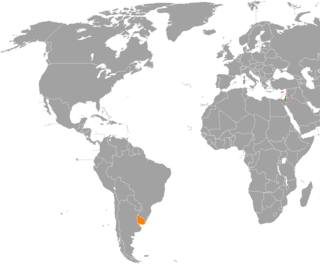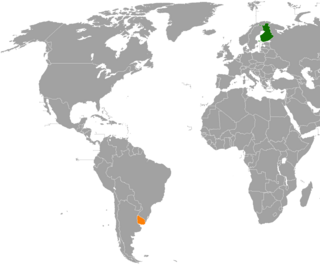 | |
United States | Uruguay |
|---|---|


Relations between the United States and the Uruguay traditionally have been positive, based on a common outlook and emphasis on democratic ideals.
 | |
United States | Uruguay |
|---|---|


Relations between the United States and the Uruguay traditionally have been positive, based on a common outlook and emphasis on democratic ideals.
In historical perspective, starting in the 1890s Uruguay took the lead in reaching out to the U.S. in order to counter the heavy British business presence. The U.S. responded in friendly fashion. Knarr argues:
The US supported the civic-military dictatorship in Uruguay from 1973 to 1985.
In 2002, The United States and Uruguay created a Joint Commission on Trade and Investment (JCTI) to exchange ideas on a variety of economic topics. In March 2003, the JCTI identified six areas of concentration until the eventual signing of the Free Trade Area of the Americas (FTAA): customs issues, intellectual property protection, investment, labor, environment, and trade in goods. In late 2004, the United States and Uruguay signed an Open Skies Agreement, which was ratified in May 2006. In November 2005, they signed a Bilateral Investment Treaty (BIT), which entered into force on November 1, 2006. A Trade and Investment Framework Agreement (TIFA) was signed in January 2007. More than 80 U.S.-owned companies operate in Uruguay, and many more market U.S. goods and services.
Uruguay cooperates with the U.S. on law enforcement matters such as regional efforts to fight drug trafficking and terrorism. It has also been very active in human rights issues.
From 1999 through early 2003, Uruguayan citizens were exempted from visas when entering the United States under the Visa Waiver Program. This exemption was withdrawn on April 16, 2003, based on the high overstay rates for Uruguayans and worldwide national security concerns.
Under Tabaré Vázquez, President of Uruguay from 2005 to 2010 and 2015 to 2020, Uruguay has taken positions on a number of issues which are very markedly different from those of the United States. However, under his right-wing successor, president Luis Lacalle Pou, since 2020, United States-Uruguay relations have again improved and strengthened. [2] Nevertheless, Vázquez sought the help of President George W Bush in the face of the crisis with Argentina around the Uruguay River pulp mill dispute. [3]
According to the 2012 U.S. Global Leadership Report, 40% of Uruguayans approve of U.S. leadership, with 22% disapproving and 38% uncertain. [4]
| Coat of Arms |  |  |
| Flag |  |  |
| Population | 3,286,314 [5] | 335,976,000 |
| Area | 176,215 km2 (68,036 sq mi) | 9,526,468 km2 (3,794,066 sq mi) [6] |
| Population density | 18.6/km2 (48.3/sq mi) | 31/km2 (80/sq mi) |
| Capital | Montevideo | Washington, D.C. |
| Largest city | Montevideo – 1,305,082 ( 1,947,604 Metro) | New York City – 8,175,133 (19,006,798 Metro) |
| Government | Unitary presidential constitutional republic | Federal presidential constitutional republic |
| First Leader | Fructuoso Rivera | George Washington |
| Current Leader | Luis Lacalle Pou | Joe Biden |
| Official languages | Spanish | English (de facto) |
| Main religions | 58.2% Christianity (47.1% Roman Catholic, 11.1% Protestant), 40.4% non-religious, 0.6% Umbanda, 0.5% Judaism, 0.1% Buddhist, 0.4% other [7] | 70.6% Christianity (46.5% Protestantism, 20.8% Catholicism, 1.6% Mormonism, 1.7% Other Christianity), 22.8% non-Religious, 1.9% Judaism, 0.9% Islam, 0.7% Buddhism, 0.7% Hinduism [8] |
| Ethnic groups | 88% White Latin American, 8% Mestizo, 4% Afro-Uruguayan | 74% White American, 13.4% African American, 6.5% Some other race, 4.4% Asian American, 2% Two or more races, 0.7% Native American or Native Alaskan, 0.14% Native Hawaiian or Pacific Islander |
| GDP (nominal) | $58.123 billion ($16,638 per capita) | $14.4 trillion ($47,440 per capita) |
| GDP (PPP) | $77.800 billion ($16,638 per capita) | $18.558 trillion ($57,220 per capita) |

This article deals with the diplomatic affairs, foreign policy and international relations of Uruguay. At the political level, these matters are officially handled by the Ministry of Foreign Relations, also known as Cancillería, which answers to the President.

Tabaré Ramón Vázquez Rosas was a Uruguayan politician and oncologist who served as the 39th and 41st president of Uruguay from 2005 to 2010 and from 2015 to 2020. During his political career, Vázquez was a member of the Broad Front coalition. Before his first presidential term, Vázquez was president of the Club Progreso team and made two unsuccessful presidential bids in 1994 and 1999. He served as Intendant of Montevideo between 1990 and 1994 shortly before his first presidential campaign.

Italy–Uruguay relations are the current and historical relations between Italy and Uruguay. Both nations enjoy friendly relations, the importance of which centers on the history of Italian migration to Uruguay. Approximately 40% of the Uruguayan population is of Italian origin. Both nations are members of the United Nations.

Canada–Uruguay relations are foreign relations between Canada and the Republic of Uruguay. Both countries are members of the Cairns Group, the Organization of American States and the United Nations.

France–Uruguay relations are the current and historical relations between the French Republic and the Oriental Republic of Uruguay. Both nations enjoy friendly relations, the importance of which centers on the history of French migration to Uruguay. In the late 19th century, one-third of Uruguay's population was of French descent. Both nations are members of the United Nations.

Relations between the People's Republic of China and the Oriental Republic of Uruguay were first established in 1988. Relations were defined as “friendly and cooperative” by the Chinese government. The bilateral relation was promoted to a strategic partnership in 2016.

Japan–Uruguay relations are foreign relations between Japan and Uruguay. Both countries are members of the United Nations and the World Trade Organization.

Israel–Uruguay relations are foreign relations between Israel and Uruguay. Uruguay was the first South American country and the fourth in the world to recognize Israel.

Mexico–Uruguay relations are foreign relations between Mexico and Uruguay. Both nations are members of the Latin American Integration Association, Organization of American States, Organization of Ibero-American States and the United Nations.

Foreign relations between the Argentine Republic and the Oriental Republic of Uruguay have existed for over a century. Both countries were part of the Spanish Empire until the early 19th century.

Spain–Uruguay relations are the current and historical relations between Spain and Uruguay. There is community of 67,000 Spanish nationals residing in Uruguay and 33,000 Uruguayan nationals residing in Spain. Both nations are members of the Association of Spanish Language Academies, Organization of Ibero-American States and the United Nations.

Poland–Uruguay relations are foreign relations between Poland and Uruguay. Neither country has a resident ambassador. Both nations are members of the United Nations.

Colombia–Uruguay relations refers to the diplomatic relations between the Republic of Colombia and the Oriental Republic of Uruguay. Both nations are members of the Cairns Group, Community of Latin American and Caribbean States, Group of 77, Latin American Integration Association, Organization of American States, Organization of Ibero-American States and the United Nations.

Cuba–Uruguay relations refers to the diplomatic relations between the Republic of Cuba and the Oriental Republic of Uruguay. Both nations are members of the Community of Latin American and Caribbean States, Group of 77, Organization of Ibero-American States and the United Nations.

Costa Rica–Uruguay relations refers to the diplomatic relations between Costa Rica and Uruguay. Both nations are members of the Community of Latin American and Caribbean States, Group of 77, Organization of American States, Organization of Ibero-American States and the United Nations.

El Salvador–Uruguay relations refers to the diplomatic relations between the Republic of El Salvador and the Oriental Republic of Uruguay. Both nations are members of the Community of Latin American and Caribbean States, Group of 77, Organization of American States, Organization of Ibero-American States and the United Nations.

Portugal–Uruguay relations refers to the current and historical relations between Portugal and Uruguay. Both nations are members of the Organization of Ibero-American States and the United Nations.

India is represented in Uruguay through its embassy in Buenos Aires in Argentina; it also has a consulate general in Montevideo. Uruguay has an embassy in New Delhi and a consulate in Mumbai. Diplomatic relations were established in 1948. The Uruguayan embassy in New Delhi was first opened in 1960 and operated until 1975. It was re-opened in 1998. In May 2010, Uruguayan ambassador to India Cesar Ferrer requested India to open an embassy in Montevideo.

Finland–Uruguay relations are the bilateral relations between Finland and Uruguay. Both nations are members of the United Nations.

The Aarón de Anchorena National Park is a park and rest residence of the President of Uruguay. It is located in the Colonia Department, in southwestern Uruguay, 208 kilometers from Montevideo. It was donated by the Argentine farmer Aarón de Anchorena to the Uruguayan state.
![]() This article incorporates public domain material from U.S. Bilateral Relations Fact Sheets. United States Department of State.
This article incorporates public domain material from U.S. Bilateral Relations Fact Sheets. United States Department of State.